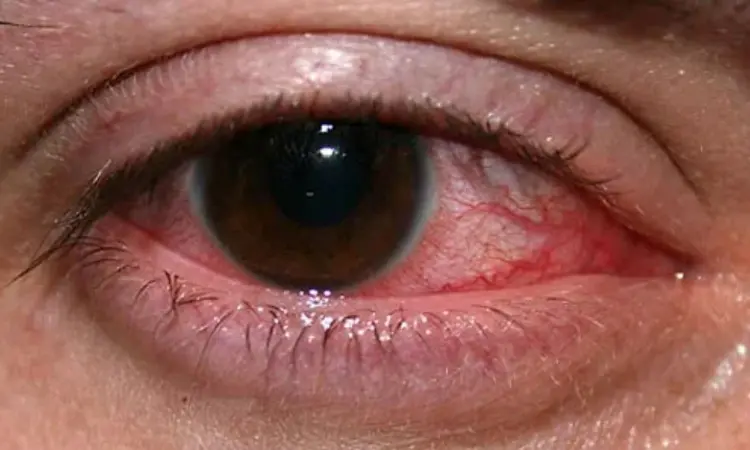- Home
- Medical news & Guidelines
- Anesthesiology
- Cardiology and CTVS
- Critical Care
- Dentistry
- Dermatology
- Diabetes and Endocrinology
- ENT
- Gastroenterology
- Medicine
- Nephrology
- Neurology
- Obstretics-Gynaecology
- Oncology
- Ophthalmology
- Orthopaedics
- Pediatrics-Neonatology
- Psychiatry
- Pulmonology
- Radiology
- Surgery
- Urology
- Laboratory Medicine
- Diet
- Nursing
- Paramedical
- Physiotherapy
- Health news
- Fact Check
- Bone Health Fact Check
- Brain Health Fact Check
- Cancer Related Fact Check
- Child Care Fact Check
- Dental and oral health fact check
- Diabetes and metabolic health fact check
- Diet and Nutrition Fact Check
- Eye and ENT Care Fact Check
- Fitness fact check
- Gut health fact check
- Heart health fact check
- Kidney health fact check
- Medical education fact check
- Men's health fact check
- Respiratory fact check
- Skin and hair care fact check
- Vaccine and Immunization fact check
- Women's health fact check
- AYUSH
- State News
- Andaman and Nicobar Islands
- Andhra Pradesh
- Arunachal Pradesh
- Assam
- Bihar
- Chandigarh
- Chattisgarh
- Dadra and Nagar Haveli
- Daman and Diu
- Delhi
- Goa
- Gujarat
- Haryana
- Himachal Pradesh
- Jammu & Kashmir
- Jharkhand
- Karnataka
- Kerala
- Ladakh
- Lakshadweep
- Madhya Pradesh
- Maharashtra
- Manipur
- Meghalaya
- Mizoram
- Nagaland
- Odisha
- Puducherry
- Punjab
- Rajasthan
- Sikkim
- Tamil Nadu
- Telangana
- Tripura
- Uttar Pradesh
- Uttrakhand
- West Bengal
- Medical Education
- Industry
Treatment with EGFR inhibitors in lung cancer patients tied to increased risk of new-onset keratitis: JAMA

USA: A US population-based cohort study showed an increased risk of new-onset keratitis in patients with lung cancer treated with epidermal growth factor receptor inhibitors (EGFRis), especially with the second-generation EGFRi afatinib.
The cohort study of 1,388 108 lung cancer patients revealed that the risk of new-onset keratitis was higher among those treated versus not treated with EGFRis.
The findings, published in JAMA Ophthalmology, support the need for prompt diagnosis and management of EGFRi-associated ocular issues to prevent severe complications or treatment disruptions.
"Over 20 years, 1.12% of patients who were treated with EGFR inhibitors developed new-onset keratitis compared with 0.74% of those who did not take these drugs (HR 1.520)," the researchers reported. "Patients treated with EGFR inhibitors -- including erlotinib (Tarceva), gefitinib (Iressa), afatinib (Gilotrif), and osimertinib (Tagrisso) -- had higher risks of superficial keratitis (HR 1.635), keratoconjunctivitis (HR 1.367), and corneal ulcer (HR 2.132)."
They noted that patients taking the second-generation EGFR inhibitor afatinib had the highest risk of keratitis (HR 2.229), though the risk was still observed with osimertinib, the standard first-line option in the metastatic setting (HR 1.591).
Epidermal growth factor receptor inhibitors have been reported to be linked with ocular and cutaneous side effects; however, evidence is limited of an association between EGFRi treatment and keratitis. To fill this knowledge gap, Pin-Chia Huang, Chan School of Public Health, Boston, Massachusetts, and colleagues aimed to investigate the association between EGFRi treatment and agents and the risk of new-onset keratitis among patients with lung cancer.
For this purpose, they examined TriNetX data of lung cancer patients treated with or without EGFRis between 2003 and 2023. Exposures included treatment with epidermal growth factor receptor inhibitors, including the first-generation agents erlotinib and gefitinib, the second-generation agent afatinib, and the third-generation agent osimertinib.
Logistic and Cox proportional hazards regression were used to determine the risk of new-onset keratitis among patients with lung cancer receiving EGFRi treatment.
Based on the study, the researchers reported the following findings:
- Among 1,388 108 patients with lung cancer, 22 225 received EGFRis (mean age, 69.7 years; 62.8% females and 37.2% males).
- Patients treated with EGFRis had a higher risk of keratitis than nonexposed patients (hazard ratio [HR], 1.520).
- Subtypes of EGFRi-associated keratitis included superficial keratitis (HR, 1.635), keratoconjunctivitis (HR, 1.367), and corneal ulcer (HR, 2.132).
- Patients taking afatinib had a higher risk of keratitis (HR, 2.229).
"These findings should be considered when evaluating the corneas of patients treated with epidermal growth factor receptor inhibitors," the researchers concluded.
Reference:
Huang P, Lin C, Dana R, Ma KS. Epidermal Growth Factor Receptor Inhibitors for Lung Cancer and the Risk of Keratitis. JAMA Ophthalmol. Published online January 11, 2024. doi:10.1001/jamaophthalmol.2023.6089
Dr Kamal Kant Kohli-MBBS, DTCD- a chest specialist with more than 30 years of practice and a flair for writing clinical articles, Dr Kamal Kant Kohli joined Medical Dialogues as a Chief Editor of Medical News. Besides writing articles, as an editor, he proofreads and verifies all the medical content published on Medical Dialogues including those coming from journals, studies,medical conferences,guidelines etc. Email: drkohli@medicaldialogues.in. Contact no. 011-43720751


